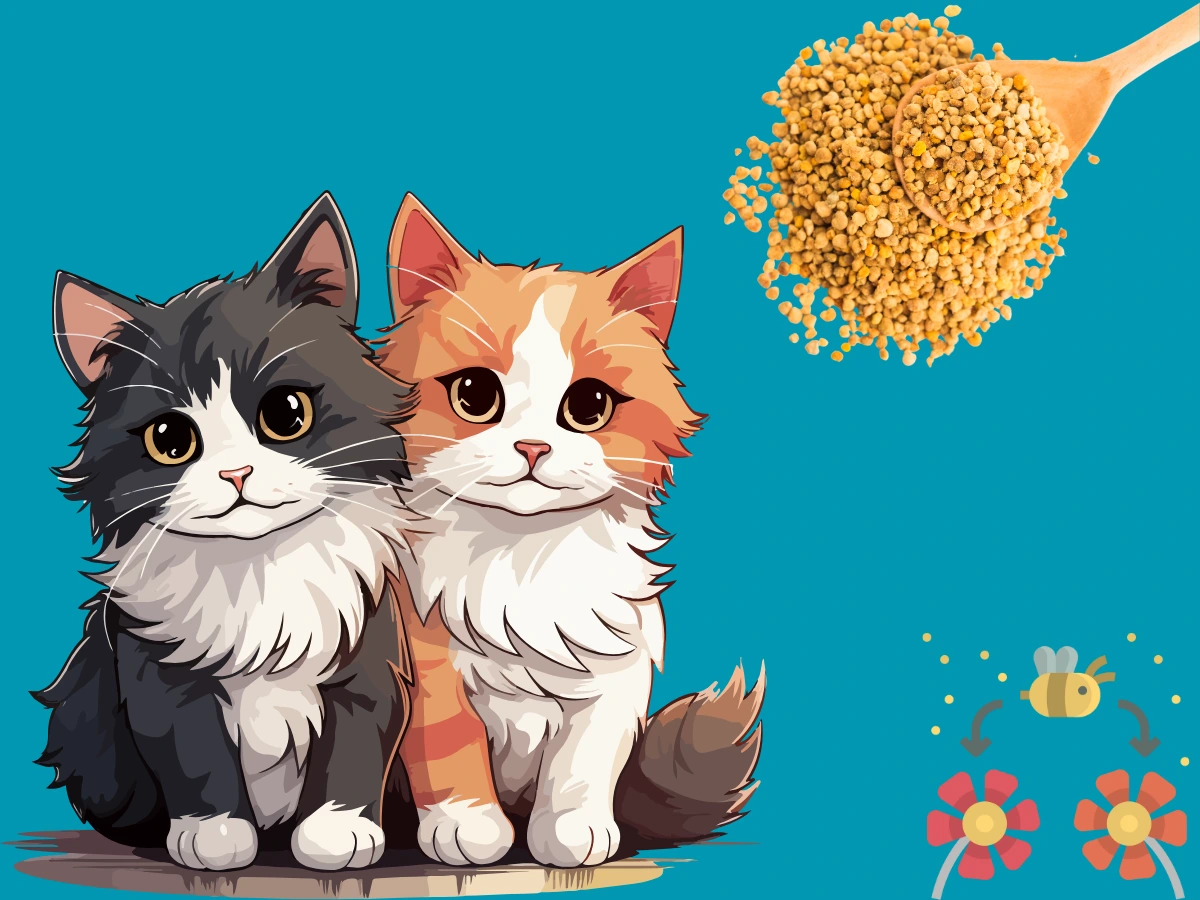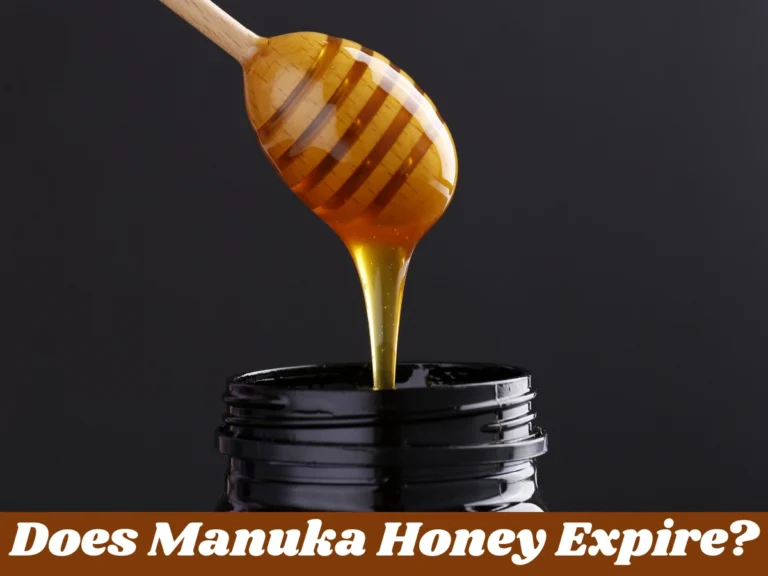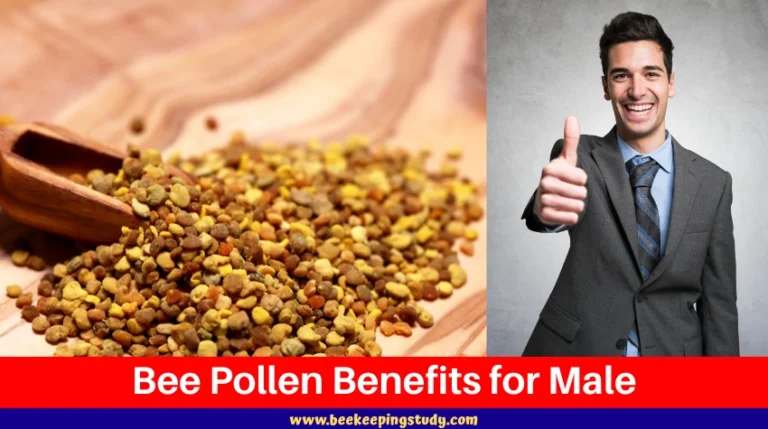This post might be created with help from AI tools and carefully reviewed by a human (Anthor Kumar Das). For more on how we use AI on this site, check out our Editorial Policy.
Bee Pollen for Cats: Benefits and Risks Explained
Bee pollen for cats is gaining popularity among holistic pet owners — but is it truly safe and beneficial for your feline companion? As more cat parents seek natural ways to support their pets’ health, understanding the pros and cons of bee pollen becomes essential.
In this guide, we’ll gently walk through:
-
Whether bee pollen is actually good for cats.
-
The science-backed bee pollen benefits for cats.
-
Common concerns like bee pollen for cat allergies.
- And help you decide if this superfood supplement is right for your pet.
Whether you’re just curious or seriously considering it, I’ve got you covered with expert-backed insights.
Understanding Bee Pollen and Its Nutritional Value
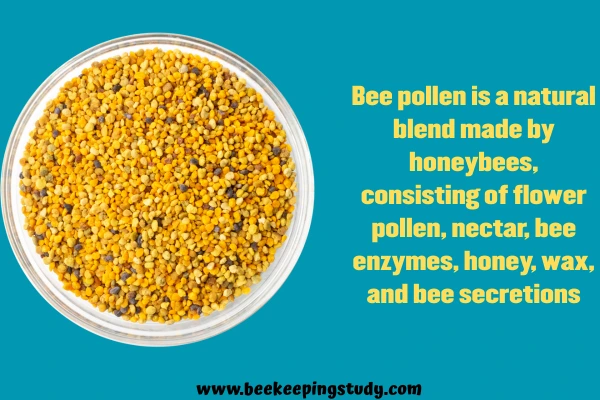
Before exploring the bee pollen benefits for cats, it helps to understand what this golden dust really is. Bee pollen is a natural blend made by honeybees, consisting of flower pollen, nectar, bee enzymes, honey, wax, and bee secretions. It’s often celebrated as a “superfood” because of its rich nutritional profile — not just for humans, but potentially for our pets too.
Nutrient Composition of Bee Pollen
Bee pollen is nutrient-dense, meaning even a small amount contains a powerhouse of goodness that may contribute to your cat’s vitality. Here are some of the standout nutrients and why they matter:
-
Proteins: Bee pollen contains up to 35% protein, essential for muscle maintenance, tissue repair, and healthy skin and coat in cats.
-
B-Complex Vitamins: These include B1, B2, B6, and niacin — crucial for energy production and supporting your cat’s brain and nervous system.
-
Minerals: Rich in calcium, magnesium, zinc, and potassium, these minerals help with bone strength, heart function, and overall cellular health.
-
Antioxidants: Compounds like flavonoids and carotenoids help fight oxidative stress, support the immune system, and may reduce inflammation — especially important for cats with allergies or chronic conditions.
Why This Matters for Your Cat
While cats have different dietary needs than humans, these nutrients may still provide targeted benefits when used carefully. For instance, antioxidants in bee pollen may help with cat allergies, while B vitamins support mood and energy — especially helpful for older or more lethargic cats.
Is Bee Pollen Good for Cats?
If you’re wondering, “Is bee pollen good for cats?” — the short answer is: it can be, but with a few important considerations. While bee pollen is not an essential part of a cat’s diet, many holistic pet owners and integrative veterinarians believe it may offer a range of health-supporting benefits when used in moderation.
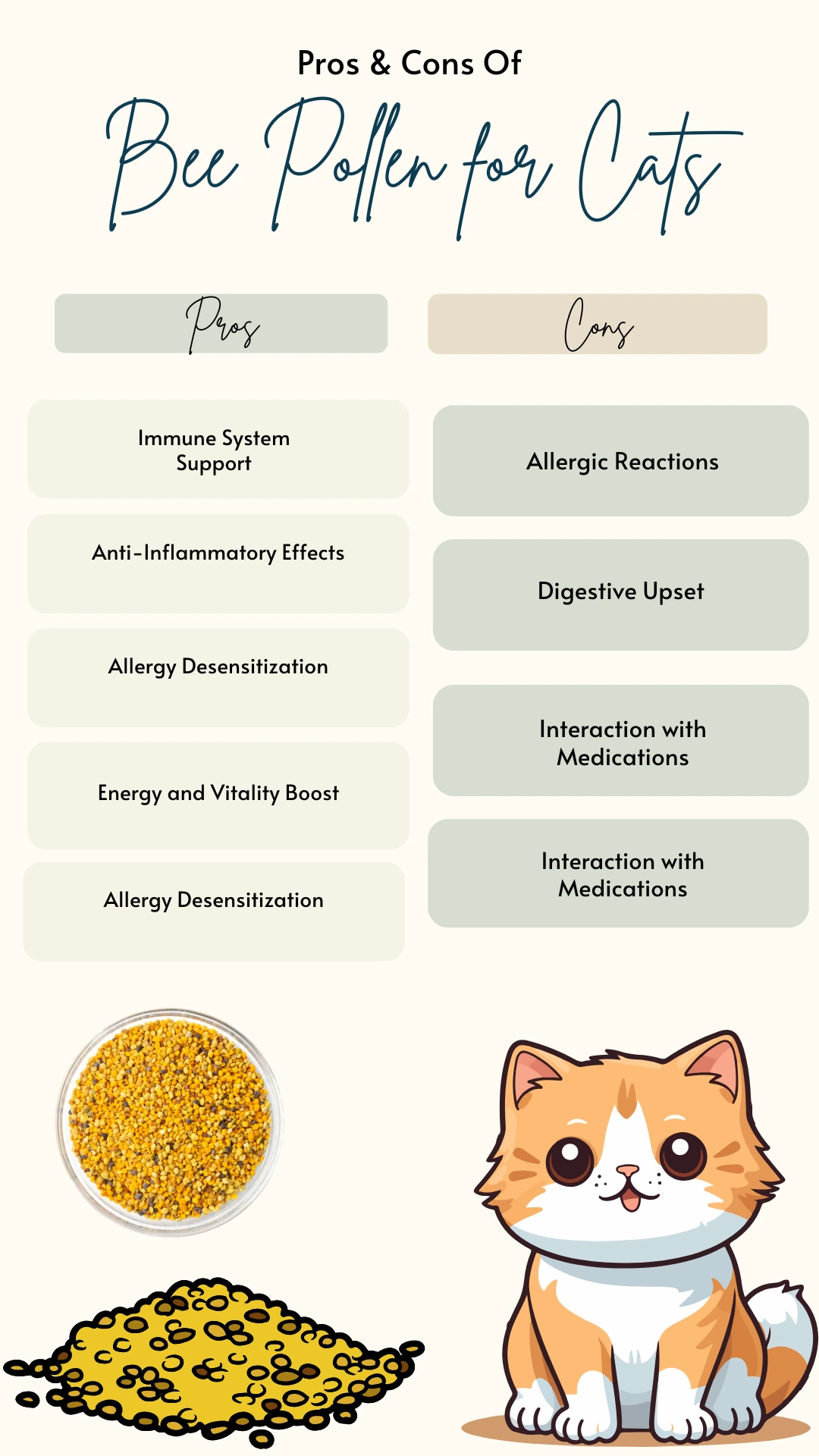
Benefits of Bee Pollen for Cats
Let’s explore the key bee pollen benefits for cats:
1. Immune System Support
Bee pollen is rich in antioxidants like carotenoids and flavonoids, which help neutralize free radicals in the body. This immune-boosting property may be especially helpful for cats dealing with seasonal allergies or chronic inflammatory conditions.
2. Anti-Inflammatory Effects
Some studies in animals suggest that bee pollen has natural anti-inflammatory properties. For cats suffering from joint stiffness, digestive upset, or skin issues, a small amount of bee pollen may offer relief by reducing internal inflammation.
3. Allergy Desensitization
Interestingly, bee pollen is sometimes used to desensitize the immune system to allergens — a process similar to how allergy shots work in humans. In cats, this may support those with mild allergic reactions to environmental triggers, though it should always be introduced cautiously and under vet supervision.
4. Energy and Vitality Boost
Thanks to its high content of B-complex vitamins and amino acids, bee pollen may help boost your cat’s natural energy levels. This can be especially helpful for older cats, post-illness recovery, or periods of low appetite or energy.
5. Skin and Coat Health
Nutrients like zinc, biotin, and selenium found in bee pollen may support healthier skin, shinier fur, and reduced shedding. If your cat suffers from dry skin or a dull coat, bee pollen might help restore its natural glow.
Potential Side Effects of Bee Pollen for Cats
Despite its benefits, bee pollen isn’t suitable for every cat. Cats with bee sting allergies or highly sensitive digestive systems may react poorly to bee pollen.
The following are potential side effects of bee pollen that are hardly seen among a few cats.
-
Allergic Reactions: Some cats may develop itching, swelling, sneezing, or even breathing issues — especially if they’re allergic to pollen or bee products.
-
Digestive Upset: Bee pollen may cause vomiting, diarrhea, or stomach discomfort in sensitive cats, particularly if introduced too quickly or in large amounts.
-
Interaction with Medications: Bee pollen could potentially interfere with medications, especially immune-modulating drugs or steroids.
-
Contamination Risk: Poor-quality or non-organic bee pollen may contain pesticides or pollutants that are harmful to pets.
-
Not Suitable for Kittens or Pregnant Cats: There’s limited research on safety for kittens or pregnant/nursing cats, so it’s best avoided in these cases unless approved by a vet.
Always start with a tiny amount (a few granules) and monitor your cat closely. If you’re unsure, consult your vet before introducing any new supplement to your pet’s diet.
How to Safely Introduce Bee Pollen to Your Cat
If you’re ready to try bee pollen for cats, it’s important to start slow and pay attention to how your cat responds. Just like with any supplement, gradual introduction and careful observation are key to ensuring your cat benefits without side effects.
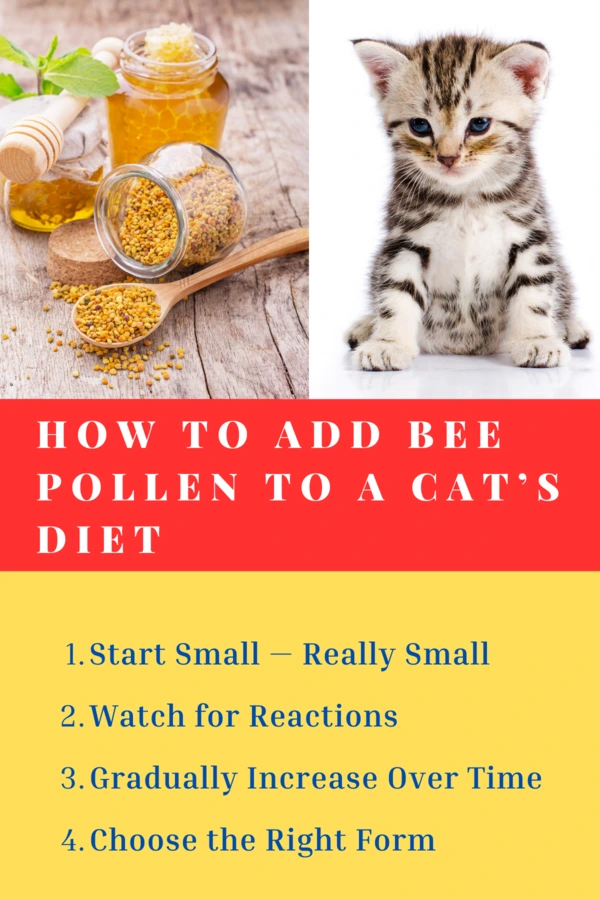
Step-By-Step Guide to Add Bee Pollen to a Cat’s Diet
The following is my step-by-step guide for pet lovers to use bee pollen for cats.
1. Start Small — Really Small
Begin with just 1–2 granules of bee pollen sprinkled over your cat’s food. This tiny amount helps you detect any allergic reactions or digestive sensitivity without overwhelming their system.
2. Watch for Reactions
For the first 24–48 hours, monitor your cat closely for:
-
Sneezing, itching, or swelling
-
Vomiting or diarrhea
-
Lethargy or refusal to eat
If any of these occur, stop use immediately and consult your veterinarian.
3. Gradually Increase Over Time
If no side effects appear, you can slowly increase the amount over the next week. A general safe range (for healthy adult cats) is:
-
Up to 1/4 teaspoon per day, depending on size and tolerance.
Never exceed recommended amounts without professional advice.
4. Choose the Right Form
Bee pollen is commonly available as:
-
Granules: Easy to sprinkle on food
-
Powder: Mixes well into wet food
-
Capsules or tablets: Not ideal unless prescribed
Look for organic, pesticide-free bee pollen sourced from trusted suppliers to avoid contaminants.
5. Consult Your Vet First
Before adding bee pollen to your cat’s routine, especially if your pet has allergies, chronic conditions, or takes medication, it’s always best to speak with your veterinarian. They can help tailor dosage and monitor any unexpected effects.
Pro tips: For cats with seasonal allergies, some pet owners use bee pollen ahead of allergy season to potentially build resistance — but this should always be done under vet supervision.
Frequently Asked Questions
Yes, in some cases. Cats that are sensitive or allergic to bee pollen may experience sneezing, itching, or digestive upset when exposed to it, especially in supplement form like bee pollen. Cats can eat small amounts of bee pollen if they’re not allergic. It should always be introduced gradually and with your vet’s approval to ensure safety. Possible side effects include allergic reactions (itching, swelling), vomiting, diarrhea, or lethargy. Always start with a small dose and monitor closely. Look for raw, organic, pesticide-free bee pollen sourced from trusted farms. Avoid products with additives or artificial preservatives.Does bee pollen make cats sick?
Can cats eat pollen?
What are the negative side effects of bee pollen?
How do I choose the best bee pollen for my pets?
Final Thoughts: Should You Give Bee Pollen to Your Cat?
Bee pollen for cats is a promising natural supplement that may offer benefits like immune support, allergy relief, and improved skin and coat health. While many cats tolerate it well in small doses, it’s not a one-size-fits-all solution — and not every cat will benefit from it the same way.
If you’re considering trying bee pollen, take it slow, observe your pet carefully, and always prioritize quality. When in doubt, your veterinarian is the best guide for personalized advice.
Vet Disclaimer: This article is for informational purposes only and is not a substitute for professional veterinary advice. Always consult your veterinarian before introducing new supplements like bee pollen into your cat’s diet, especially if your pet has pre-existing health conditions or allergies.
The following are the articles you might check next.

